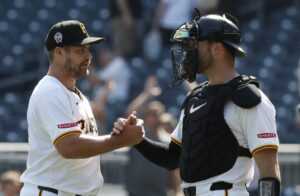Postseason Mariano Rivera Was Even Better than You Think
When time progresses further away from the end of a player’s career, the appreciation of his greatness often diminishes. It can be because a fewer amount of living people saw him play. Recency Bias also creeps in. But sometimes it is due to self-appointed experts throwing unsubstantiated myths around or treating statistics superficially. It can also come from them misusing or misreading statistics altogether. One would think that the elite-level players, like retired New York Yankees reliever and Hall of Famer Mariano Rivera, would be immune. However, even he is not.
We’ve all seen these tired and ill-informed arguments. The following sentence can sum them up. “Pretty easy to be great pitching one inning at a time with a three-run lead and the bases empty.” The thing is – he didn’t pitch one inning at a time every time he came into a postseason game. He didn’t always come in with a three-run lead. The bases were not empty every time he pitched. Rarely did he get a save, in fact, where he gave up an earned, unearned, or inherited run in the process.
The truth is – in the postseason, Rivera was even better than a lot of us realize. And most baseball fans already know that he was insanely good. He pitched 141 postseason innings in 96 appearances that were spread over 16 seasons. Only twice did he allow a home run – Sandy Alomar Jr. in Game Four of the 1997 ALDS and Jay Payton in Game Two of the 2000 World Series. He allowed 11 earned runs (out of 13 total), giving him a career postseason ERA of 0.70. Of the 53 runners he inherited when entering a game, only ten scored – 19%. He also allowed 86 total hits (19 for extra bases) and 21 walks for a WHIP of 0.759.
Insanely High Save Percentage
(Rivera Postseason Game Log. Compiled by author using data from Baseball Reference.)

In his 96 postseason appearances, Mariano Rivera notched 42 saves – a fitting coincidence, since he wore number 42 – in 47 opportunities. Of the five blown saves, the Yankees came back to win one of the games. That was Game Two of the 2004 ALDS against the Minnesota Twins, where the Yankees won 7-6 in 12 innings on a sacrifice fly to right off J.C. Romero by Hideki Matsui. The other four blown saves are all famous – 1997 ALDS against the Cleveland Indians, two against the Boston Red Sox in the 2004 ALCS, and Game Seven of the 2001 World Series against the Arizona Diamondbacks. The last game listed was also the only one where Rivera was the losing pitcher.
Part of why his blown saves are so famous is because they were so infrequent. His postseason save percentage is 89%. The ratio of saves to blown saves is 8.4 to 1. (In Rivera’s career (1995-2013), the MLB average was 2.1 to 1 — 22,796 saves and 11,108 blown saves.)
Goose Eggs
Mariano Rivera had an impressive save percentage, yes. However, saves can be deceptive. Some saves are nail-biters that elicit sighs of relief upon completion. Others, such as those that come where the team led by three going into the ninth – come where there was really no doubt of success the entire time.
Nate Silver of FiveThirtyEight invented a statistic that distinguishes between the two, and several previous analyses from this author have used it. It is called the goose egg, and it measures clutch, scoreless relief innings. In brief, a reliever gets a goose egg for every inning (not game – every inning) where all of the following occur:
- Seventh inning or later
- When he faces the first batter of the inning, his team leads by two runs or less, the game is tied, or the tying run is either on base or at bat
- No inherited runs scored and no runs (earned or unearned) are charged to the pitcher
- Pitcher records last out of inning
- Number of inherited runners plus outs recorded by the pitcher is three or greater
In goose egg situations where the pitcher has at least one earned run charged to him and he fails to close out the win for his team, he gets a broken egg. If he gets neither in a goose egg situation, he gets a “meh.”
Goose Egg Record of Mariano Rivera
Mariano Rivera had 84 goose eggs in his postseason career versus three broken eggs. He also had five mehs. The historical average of goose eggs to broken eggs – dating back to 1921 – is 3:1. Rivera’s ratio was 28:1. That’s not just good – that’s other-worldly.
Just over one third of Rivera’s postseason appearances (33 of 96) included an inherited runner. Remember – if he’s in a goose egg situation and allows an inherited runner to score, he gets a “meh.” Rivera had only five of those total. Of the 53 runners who were on base when he entered the game, only ten scored. That gives him an Inherited Runners Scored Percentage (IS%) of 19%. The league-wide average since 1969 is 33% — 14 percentage points higher than Rivera.
In his first two seasons – 1995 and 1996 – he was not the closer. John Wetteland was. Rivera made 11 appearances and notched at least one goose egg in nine of them. In the other two, the Yankees were behind when he entered the game, so a goose egg was not even possible. Of Rivera’s 42 postseason saves and four holds, he also had at least one goose egg in 29 of the saves and all of the holds. He only recorded a “meh” in one of his 42 saves. Consequently, the “with a three-run lead” part of the ill-informed arguments simply is not true, since only 13 of his combined 46 saves and holds – 28% – were of that variety.
More than Three Outs

Mariano Rivera was not at all a “one-inning” guy. Of his 96 appearances, he pitched three outs or less 38 times – with two one-out appearances, four two-out appearances, and 32 three-out appearances. That means that in 58 appearances, he pitched in multiple innings.
His longest postseason appearance came in his very first – Game Two of the 1995 ALDS against the Seattle Mariners. He took over in the top of the top of the 12th with a runner on first, two out, and Jay Buhner at the plate. Wetteland, despite 3 1/3 strong innings of three-hit ball, had just surrendered a home run to Ken Griffey Jr. and a single to Edgar Martinez. The last time he had faced Buhner, he gave up a double. Rivera struck Buhner out to end the threat. The Yankees tied the game in the bottom of the 12th on an RBI double by Ruben Sierra. Rivera pitched three more innings to send the game to the bottom of the 15th, where Jim Leyritz won the game on a two-run walk-off home run. Rivera earned the win – the first of eight in his postseason career – in a 10-out effort.
Eight Outs and Seven Outs
His second-longest postseason appearance came in the Grady Little/Aaron Boone Game, the seventh game of the 2003 ALCS. Rivera pitched three shutout innings of two-hit ball to get the win. He had one eight-out appearance, pitching from the seventh to ninth innings in Game Two of the 1996 ALDS against the Texas Rangers. (There was one out when he entered the game.) The Yankees were down by a run when he entered but tied the game on a one-out single in the bottom of the eighth by Cecil Fielder. They ultimately won, 5-4, on a throwing error by Rangers third baseman Dean Palmer on a sacrifice bunt attempt in the bottom of the 12th.

His fourth-longest – and only remaining postseason appearance of greater than six outs – came in Game Two of the 2009 ALCS. He entered the game against the Los Angeles Angels in the top of the eighth with runners on first and second, two out, and a tie score. After getting out of the inning unscathed, he pitched a scoreless ninth and tenth. The Yankees ultimately won the game on a botched double play attempt in the bottom of the 13th. He also had 29 six-out appearances, nine five-out appearances, and 16 four-out appearances.
To sum up his saves – none of them came in an appearance of less than three outs. Only 11 of his 42 were one-inning saves. That’s roughly one-fourth of them. Eleven of his saves were of the four-out variety, six were five-out saves, and 14 of them were six-out saves. One inning at a time? No. Not at all.
Comebacks Even More Impressive
And that’s what made the comebacks by the Indians, Red Sox, and Diamondbacks even more impressive. The Indians were facing the defending-champion Yankees in the 1997 ALDS. Mariano Rivera took the mound in the bottom of the eighth of Game Four with the Yankees leading, 2-1, and holding a 2-1 series lead. They were six defensive outs from advancing to the ALCS. At the time, Rivera had given up one earned run in 21 postseason innings for a microscopic ERA of 0.43. With two outs, Alomar hit his famous homer to right, tying the game. This gave Rivera his first postseason blown save and first broken egg.
Ramiro Mendoza took over in the bottom of the ninth. Marquis Grissom – who, in the 1996 World Series, scored the first-ever postseason earned run off Rivera – led off the ninth with a single to shallow right. Bip Roberts bunted him over to second. Omar Vizquel then ripped a hard liner that Mendoza deflected with his glove. It caromed into left field past a diving Derek Jeter, allowing Grissom to score easily from second and send the series to a fifth game. The Indians won that to make the ALCS.
The 2004 Postseason
One of Rivera’s blown saves slips under the radar. That came in Game Two of the 2004 ALDS against the Minnesota Twins. Rivera inherited two runners as he relieved Tom Gordon in the top of the eighth with one out. Justin Morneau led off against him with a Texas Leaguer to shallow right that scored Jacque Jones from second and sent Torii Hunter from first to third. Corey Koskie followed with a shot to the left field corner that bounded into the stands for a ground-rule double. It scored Hunter and made Luis Rivas – who ran for Morneau – stop at third. (He was running on the pitch and would have scored had the ball stayed in play.) However, as mentioned earlier, the Yankees ultimately won, so this game is largely forgotten.
The ALCS
Game Two against the Twins was a blown save, but since both runners who scored were inherited, it was a “meh” and not a broken egg. They also did not count against his ERA. However, one of his two most famous blown saves was a broken egg, and it happened to come in one of the most famous games in LCS history — Game Four against the Red Sox.
Most fans know what happened, so we won’t go into too much detail here. He pitched a goose-egg eighth inning, despite walking one and allowing a hit. In the ninth, three outs away from sweeping the Red Sox, he gave up a leadoff walk to Kevin Millar. A stolen base by pinch-runner Dave Roberts and a single by Bill Mueller later, the Red Sox had tied the game. The Red Sox ultimately won, 6-4, on a two-run walk-off homer by David Ortiz off Paul Quantrill in the bottom of the 12th.
One day later, Rivera blew another save, and this one was a meh. It was also one of the most unfair blown saves in baseball history, since he did not allow a baserunner. He entered the game in the bottom of the eighth with nobody out and runners on the corners. The first batter he faced – Jason Varitek – flied to center, but it was deep enough to score Roberts and tie the game. Mueller and Mark Bellhorn followed with a grounder to first and a swinging strikeout, respectively, to retire the side. The Red Sox ultimately won this one in the 14th, when a single to center by Ortiz off Esteban Loaiza scored Johnny Damon from second.
The 2001 World Series
Those comebacks were impressive enough, but Game Seven of the 2001 World Series was even more impressive. Entering that fateful inning, Rivera’s goose egg-broken egg ratio was a mind-boggling 55 to 1. FIFTY-FIVE TO ONE. The bottom of the ninth was the worst inning of his career, one where he allowed three hits, committed a throwing error, and hit a batter. That was also the only time Rivera blew a save and took the loss. For the D-Backs to do that against someone with the postseason resumé of Rivera is astounding and something they can truly hang their hat on.
Any downplay of the postseason success of Mariano Rivera is downright foolish. There is a reason that so many people consider Rivera to be the greatest closer ever. He is one of only eight relievers in the Hall of Fame. This is no accident. He was great in the regular season and super-human in the postseason. Yankee fans can count themselves blessed that they got to see such a special pitcher for 19 seasons, and fans of the Indians, Diamondbacks, Twins, and Red Sox can take pride that their teams were the only ones who could remind us that he was human. Let’s leave it at that and quit trying to find false flaws.




Main Photo
Embed from Getty Images






